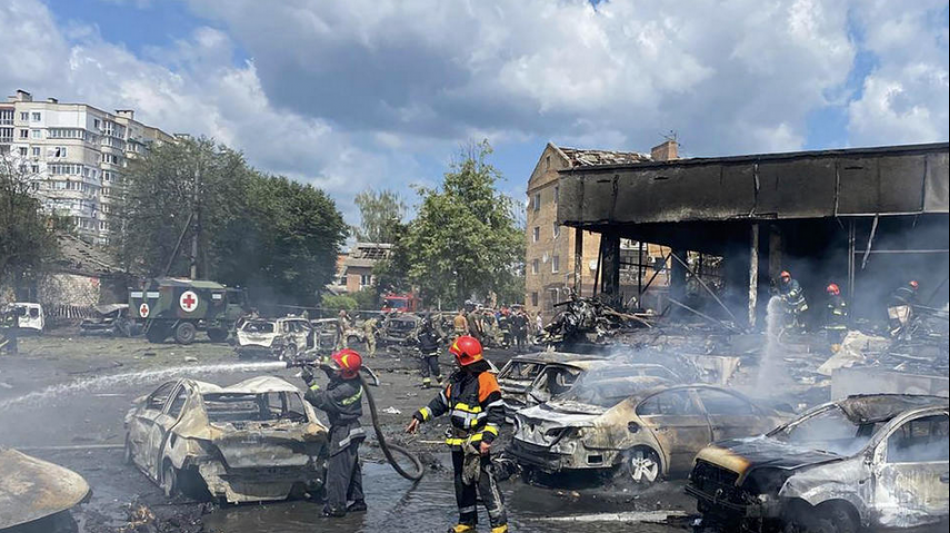-
 Three-set specialist Navarro credits billionaire dad for stamina
Three-set specialist Navarro credits billionaire dad for stamina
-
Rampant Swiatek has ball 'listening' to her in rout of Raducanu

-
 Scratchy Navarro dumps Jabeur out of Australian Open
Scratchy Navarro dumps Jabeur out of Australian Open
-
In Brazil, disinformation deals Lula a bruising defeat

-
 South Korea court to decide on extending president's detention
South Korea court to decide on extending president's detention
-
Slew of satellite projects aims to head off future wildfires

-
 TikTok could 'go dark' in US Sunday after Supreme Court ruling
TikTok could 'go dark' in US Sunday after Supreme Court ruling
-
Brutal Swiatek routs Raducanu to reach Australian Open last-16

-
 Menendez brothers' hearing delayed by LA fires
Menendez brothers' hearing delayed by LA fires
-
Tsunami survivor Sasaki overcame tragedy to reach MLB

-
 'We're entertainers': Pegula backs Djokovic call to jazz up tennis
'We're entertainers': Pegula backs Djokovic call to jazz up tennis
-
Marathon man Draper warns Alcaraz he's in for a battle

-
 Israeli government approves Gaza ceasefire deal
Israeli government approves Gaza ceasefire deal
-
Hoffman, Hoey share PGA Tour lead in La Quinta

-
 Japanese star Sasaki announces joining LA Dodgers
Japanese star Sasaki announces joining LA Dodgers
-
39 dead in Colombia guerilla violence, govt suspends peace talks

-
 The video games bedeviling Elon Musk
The video games bedeviling Elon Musk
-
Gamers tear into Musk for 'faking' video game prowess

-
 Kvaratskhelia signs for Paris Saint-Germain from Napoli
Kvaratskhelia signs for Paris Saint-Germain from Napoli
-
US Treasury to take 'extraordinary measures' to avoid debt default

-
 Lille warm up for Liverpool clash by going third in Ligue 1, Monaco lose
Lille warm up for Liverpool clash by going third in Ligue 1, Monaco lose
-
Man Utd and Scotland great Denis Law dies aged 84

-
 Frankfurt heap more pain on Dortmund as Marmoush eyes Man City move
Frankfurt heap more pain on Dortmund as Marmoush eyes Man City move
-
Canada vows 'Trump tax' on US in response to tariffs: minister

-
 'More sad than shocked': TikTok users brace for ban
'More sad than shocked': TikTok users brace for ban
-
Global equities rally, pushing London and Frankfurt to new records

-
 US grounds SpaceX's Starship after fiery mid-air explosion
US grounds SpaceX's Starship after fiery mid-air explosion
-
Frankfurt heap more pain on struggling Dortmund

-
 With Kvaratskhelia sale, Napoli turn page on historic Scudetto triumph
With Kvaratskhelia sale, Napoli turn page on historic Scudetto triumph
-
US offered infrastructure incentive for DRC-Rwanda peace deal: official

-
 Pochettino wants to see some Argentine spirit in his USA squad
Pochettino wants to see some Argentine spirit in his USA squad
-
US to tighten trade rules to hit low-cost China shipments

-
 Former Man Utd striker and 'football giant' Denis Law dies aged 84
Former Man Utd striker and 'football giant' Denis Law dies aged 84
-
Sloppy Monaco stunned by Ligue 1 strugglers Montpellier

-
 Denis Law, the king of Man Utd's 'holy trinity'
Denis Law, the king of Man Utd's 'holy trinity'
-
At VW home base, Germany's Scholz vows to revive economy

-
 Frankfurt drop Marmoush against Dortmund, confirm Man City talks
Frankfurt drop Marmoush against Dortmund, confirm Man City talks
-
Frankfurt drop Marmoush against Dortmund, confirm transfer talks

-
 US grounds SpaceX's Starship rocket pending probe
US grounds SpaceX's Starship rocket pending probe
-
Sixers star Embiid sidelined with knee swelling

-
 UK film, theatre legend Joan Plowright dies, aged 95
UK film, theatre legend Joan Plowright dies, aged 95
-
30 killed in Colombia armed violence, govt suspends rebel peace talks

-
 Trump readies for triumphant, but icy, inauguration
Trump readies for triumphant, but icy, inauguration
-
Trump inauguration moved indoors due to extreme cold

-
 Trump inauguration to be moved indoors due to cold
Trump inauguration to be moved indoors due to cold
-
Kipchoge says there's more to come after London Marathon

-
 Biden grants clemency to 2,500 people, most ever in a day
Biden grants clemency to 2,500 people, most ever in a day
-
TikTok's US future in limbo after Supreme Court ruling

-
 Trump homeland security pick calls border 'number one' threat
Trump homeland security pick calls border 'number one' threat
-
Over 230,000 flee eastern DR Congo violence since January 1: UN

South Korea: Yoon Suk Yeol shocks Nation
South Korea in Crisis: President Yoon Suk Yeol's Coup Shakes the Nation
In a stunning and unprecedented move, South Korean President Yoon Suk Yeol has attempted to seize absolute power, plunging the nation into political chaos. On the night of December 3, President Yoon declared martial law, suspended the National Assembly, and deployed soldiers to surround its premises, effectively paralysing the country’s democratic institutions. The world is watching in shock as one of Asia’s most stable democracies faces an uncertain future.
The Coup: A Nation in Shock
The events unfolded rapidly on a cold December night, leaving South Koreans and the international community reeling. President Yoon cited national security threats and alleged internal dissent as justification for his actions, but critics are calling it a blatant power grab. By suspending the National Assembly—South Korea’s legislative body—Yoon has undermined the very foundation of the nation’s democratic system.
Eyewitnesses reported heavy military presence in the capital, Seoul, as soldiers and armoured vehicles took positions near government buildings. Communication networks were temporarily disrupted, adding to the confusion. The swift and calculated nature of the coup suggests months of planning, raising questions about who within the government and military may have supported the move.
Immediate Reactions: Outrage and Resistance
The coup has sparked widespread outrage among South Koreans. Protesters took to the streets in major cities, waving banners and chanting slogans calling for Yoon’s resignation. Opposition leaders condemned the move as a betrayal of the democratic values South Korea has upheld since its transition from military rule in the 1980s.
International leaders, including the US-President Joe Biden who is still in office until 20 January 2025 and Japanese Prime Minister Fumio Kishida, have expressed grave concern. The United Nations has called for an emergency session to address the situation, while human rights organisations warn of potential crackdowns on dissent.
What Led to This Crisis?
President Yoon’s tenure has been marked by polarising leadership and a growing divide between conservatives and progressives. Critics argue that his administration’s inability to address pressing economic challenges, such as rising housing costs and youth unemployment, eroded public trust. Yoon’s approval ratings had plummeted in recent months, and his administration faced mounting scrutiny over alleged corruption scandals.
While Yoon’s justification for the coup includes vague references to national security threats, experts believe the move was motivated by a desire to cling to power amidst growing opposition. Some speculate that internal disagreements within his party and the prospect of impeachment may have pushed Yoon to take drastic action.
The Role of the Military
The military’s involvement in the coup is particularly troubling for a country with a history of authoritarian rule. South Korea transitioned to a democracy in 1987 after decades of military dictatorship, and the armed forces have since remained apolitical. Yoon’s ability to mobilise the military raises questions about divisions within the armed forces and whether dissenting voices exist among its ranks.
Should significant portions of the military oppose Yoon’s actions, the possibility of a counter-coup or internal conflict could further destabilise the nation.
Implications for South Korea’s Future
The attempted coup casts a shadow over South Korea’s hard-earned reputation as a thriving democracy. Its political stability and economic strength have made it a key player in the global arena, but this crisis threatens to derail decades of progress.
Domestically, the suspension of democratic institutions could lead to widespread unrest, civil disobedience, and a protracted power struggle. Economically, investor confidence is likely to plummet, jeopardising South Korea’s status as a global technology and trade hub.
On the international stage, the coup could strain alliances, particularly with the United States, which has long regarded South Korea as a crucial ally in countering North Korea and maintaining regional stability. China and North Korea, meanwhile, may view the situation as an opportunity to exploit South Korea’s weakened state.
The Road Ahead: Democracy or Dictatorship?
The fate of South Korea now hinges on the response of its citizens, political leaders, and international allies. Opposition parties have called for immediate action to restore democracy, including mass protests and legal challenges. Meanwhile, world leaders face the delicate task of pressuring Yoon’s government while avoiding escalation.
The unfolding crisis serves as a stark reminder that even the most established democracies are not immune to authoritarian tendencies. For South Korea, the road ahead is fraught with uncertainty, but its people have shown resilience before. Whether the nation emerges from this crisis as a stronger democracy or succumbs to authoritarian rule will shape its future—and its place in the world—for generations to come.

Moscow on alert after Crimea hit by ‘drone attack'

US Federal Reserve raises interest rate to highest level

Brasilien: Jair Bolsonaro Wahlniederlage ein

Austrian President: Second term!

Russian war crimes!

Economic chaos in Italy

Ukraine's fight against the Russian terrorist state

Live coverage of HM Queen Elizabeth II's state funeral

LIVE: Farewell to Queen Elizabeth II.

King Charles III promises 'lifelong service' to the Nation

The Queen: From Churchill to Yeltsin and Tito to Trudeau




